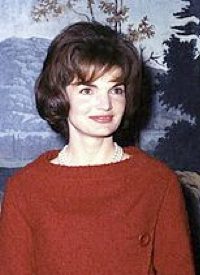
The truth is out. The leading lady of liberal America between 1960 and her death in 1994, the standard setter of au courant women with her pillbox hats, bouffant hairstyle, and jet-set friends, the Guinevere to Camelot’s King Arthur himself, didn’t much care for lesbians and Martin Luther King and other leftist world leaders.
The tapes of Jacqueline Kennedy Onassis (shown as a young First Lady, left) are out, as The New American reported, and their first installment weeks ago revealed that she thought Vice President Lyndon Johnson, the most prodigious and successful election thief in American history, had a role in the killing of her husband.
The latest release contain the whisper-voiced First Lady’s thought on everything and everyone, and she even reveals a weird fact about her husband. As London’s Daily Mail rightly put it, “The fact this purring, Chanel-clad kitten had claws shouldn’t have come as a shock.”
World Leaders
The man behind the tapes was Arthur Schlesinger Jr., the historian, Camelot courtier, and Kennedy braintruster. He interviewed Kennedy after Lee Harvey Oswald assassinated her husband on that unforgettable day of Nov. 22, 1963.
He importuned the widow to say all sorts of things to which the modern left is recoiling in horror, most notably, Kennedy’s daughter Caroline.
Charles De Gualle, Jackie says, “was my hero when I married Jack.” But not after she met the French President. She said De Gaulle was “full of spite.” Nor did Jackie like the French: “I loathe the French…. They are not very nice; they are all for themselves.”
On meeting British Prime Minister Winston Churchill with her husband, Kennedy said the World War II leader had lost his marbles and felt sad for her husband:
Jack had always wanted to meet Churchill. Well, the poor man was really quite ga-ga then.
I felt so sorry for Jack that evening because he was meeting his hero, only he met him too late.
Indonesian President Surkarno was something of a libertine, relates Kennedy. When Sukarno visited the White House, she ensured that she had a copy of a book about his personal art collection on a table, but then learned that of the paintings displayed he was mostly interested in one of a woman “‘naked to the waist with a hibiscus in her hair.” Sukarno, she said, “had a lecherous look.”
Of the famous women of her day, Mrs. Kennedy was unsparing in her thumbs-down opinion.
Future Indian Prime Minister Indira Gandhi, she said, was a “bitter, kind of pushy, horrible woman,” while Lady Bird Johnson, wife of JFK’s Vice President, was “sort of like a trained hunting dog” at her husband’s beck and call.
She even accused both South Vietnam’s First Lady, Madame Nhu (whose own husband was assassinated in a coup just 20 days before President Kennedy), known as the “oriental Lucrezia Borgia,” and Clare Boothe Luce, the congresswoman, diplomat and playwright, of illegal carnal activities: “I wouldn’t be surprised if they were lesbians.”
Yet the president’s widow had the worst things to say about American leaders. She thought liberal Democrat hero Franklin Delano Roosevelt was “an insincere show-off.”
Lyndon Johnson wasn’t just an assassin. He was a goldbricker as well:
Jack said it to me sometimes. He said, “Oh, God can you ever imagine what would happen if Lyndon was president?”
Jack would say you could never get an opinion out of Lyndon at any cabinet or national security meeting. He’d just say, you know, that he agreed with them — with everyone — or just keep really quiet.
So Lyndon, as vice president, didn’t just do anything.
Martin Luther King, as history would confirm her view, was as lecherous as Sukarno. Unlike most Americans, Jackie was privy to the tape recordings, through her brother-in-law, Attorney General Robert F. Kennedy, that divulged King’s lowbrow affinity for salacious repartee and an unhealthy appetite for sex parties. Her remarks about King include these:
He made fun of [Richard] Cardinal Cushing and said that he was drunk at it [the funeral] — and things about they almost dropped the coffin. I mean Martin Luther King is really a tricky person.
[Robert Kennedy] told me of a tape that the FBI had of Martin Luther King when he was here for the freedom march. And he said this with no bitterness or anything, how he was calling up all these girls and arranging for a party of men and women, I mean, sort of an orgy in the hotel, and everything.
I just can’t see a picture of Martin Luther King without thinking, you know, that man’s terrible.
David Garrow, King’s hagiographer, as well as top aide Ralph Abernathy, confirm that King was a pervert given to filthy jokes. Some of those jokes referred to the sexual practices of Mrs. Kennedy and her husband.
According to ABC News, “Mrs. Kennedy’s recollections of her husband’s feelings toward King were far warmer.”
She said he went out of his way to emphasize he wouldn’t “judge anyone” based on what he was told about the FBI surveillance.
“He said what an incredible speaker he was during that freedom march thing,” she recalled.
On Women
Kennedy apparently was very much a woman of her time and didn’t care for relentlessly driven careerists who put work ahead of family. She thought that only “violently liberal women in politics” would vote for JFK’s opponent in the 1960 Democratic primaries, Adlai Stevenson, because they were “scared of sex.”
She also said women don’t belong with politics because “we’re just not suited for it.”
During the Cuban Missile Crisis, Mrs. Kennedy begged her husband not to send her away in the event of war, so devoted was she to her husband, despite his noted infidelities.
She also reveals that her husband played with toys in the bathtub and said perfunctory nighttime prayers while kneeling by his bed.
Reaction
Caroline Kennedy, Mrs. Kennedy’s daughter, denies that her mother thought or meant the things she said, and attributes them to the malign influence of others or to the times in which her mother lived.
Of the comments about Martin Luther King, she told ABC’s Diane Sawyer that FBI Director J. Edgar Hoover, whose agents recorded hundreds of hours of King’s private life, manipulated her mother. “Obviously J. Edgar Hoover had passed on something that Martin Luther King said about my father’s funeral, to Uncle Bobby and to Mommy,” she told Sawyer. “ And obviously, she was upset about that.”
It shows you the poisonous … activities of J. Edgar Hoover, and the idea that this is going on at the highest levels of government is really twisted.
If you asked her what she thought of Martin Luther King overall — I mean she admired him tremendously.
Court historian Michael Bechloss agreed, telling ABC that Hoover was trying to finagle the Kennedys into disliking King. He added,
If there was anything that was going to turn her instantly against someone, that was it. She was furious at Martin [Luther] King, at what she had heard he had said about her husband’s funeral. And so, when she found out about what may or may not have been on these tapes, she was extremely ready to believe that there was some terrible things there.
One reason she might have been furious is that her husband supported King’s cause, after which King stabbed him in the back, telling ribald jokes about JFK and his wife.
Rep. John Lewis (D-Ga.) the famed “civil rights” leader, claims that Hoover made it all up, ABC reported. “He believes Hoover concocted damaging material about King to give to the Kennedys because ‘he wanted to destroy the man.’’
“He did everything possible to make Dr. King look like somebody from another planet,” said Lewis. “I cannot believe that Dr. King ever said anything in a negative manner about President Kennedy. He admired, he loved … the Kennedy family.”
“He was so moved by the speech that President Kennedy had delivered on June 12th, 1963, when he said the question of civil rights was a moral issue,” Lewis said.
Of the rest of the tapes, the former first daughter said oral history has its limits: “I think people really need to understand the purpose of an oral history,” she told ABC’s George Stephanopolous.
And it really — the value of it is it is immediate, it is honest, Caroline told me. I think that was very brave of her to do that and to be honest. But it’s got limitations. It’s just — it’s a primary source document. It’s like a diary or something like that, it’s really a snapshot.
Of the line about women staying out of politics, Kennedy told the former Clinton torpedo that her mother exemplified the times:
It was funny because my daughters listened to it too and they were just absolutely horrified…. “Did she really think that?” And of course time has moved on and it shows you both there are many timeless things in here but it really is a snapshot of a world that we barely recognize.



